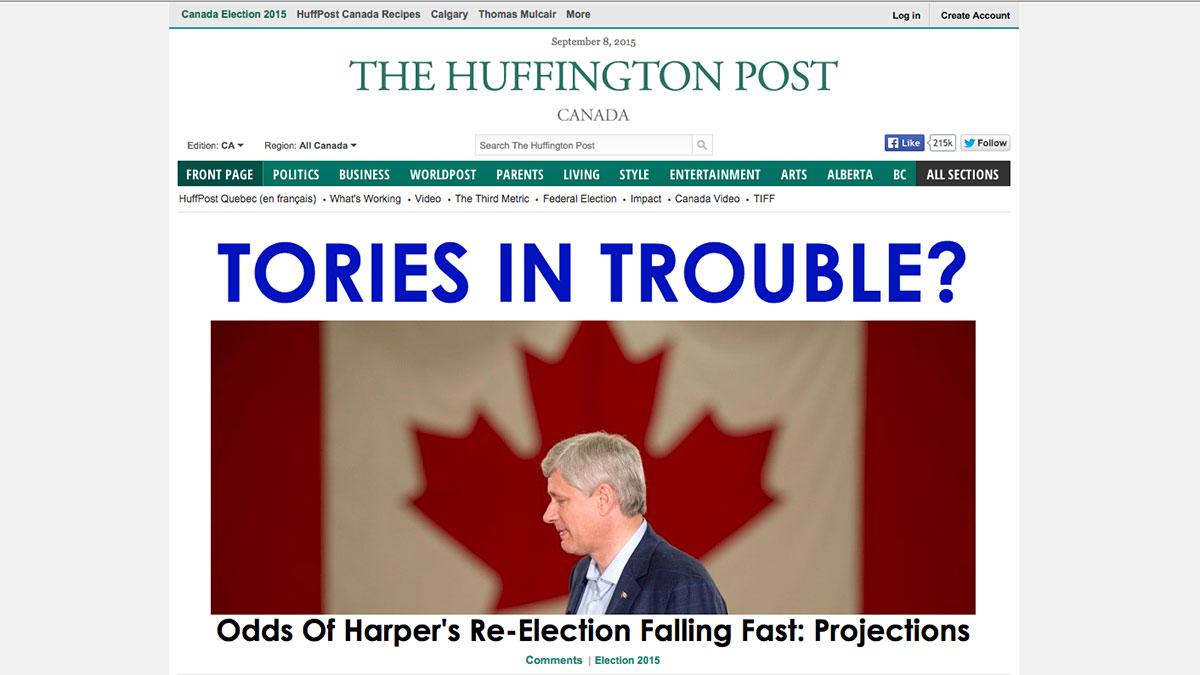Few know that biased Huffington Post is a news aggregator
 Screenshot
ScreenshotIt’s the default home page for swathes of self-styled political junkies and eager political science students, a bastion of what’s referred to as the liberal media. The Wall Street Journal editor James Taranto consistently spoonerized it as the “Puffington Host.”
That’s right, it’s The Huffington Post. The part-blog part-news aggregator is one of the most visited political sites on the web, but what are the implications of such a frequently consulted information packager being treated as “the news?”
Readers often don’t realize that Jonah Peretti and Ariana Huffington’s lovechild is not a slightly more leftist substitute for CNN, or Maclean’s — it’s the liberal analogue of The Drudge Report.
The purpose isn’t to uncover stories, though the odd scoop does appear. The purpose is to sift through pieces generated by the mainstream media, give them a liberal slant, and queue them up next to blog posts from practically anywhere. It’s heavily biased informational triage. But there is this tendency lately to confuse news-assembling operations like The Huffington Post with traditional institutions of journalism.
This is a very dangerous misapprehension to be under for two reasons. First, not everyone understands that the news they pick up off the site is more often than not siphoned from elsewhere on the web. Most of the “novel” information is merely the republishing of work done by organizations like The New York Times, The Washington Post, or The Daily Beast. Original content on the website is truly sparse. To be sure there are a few instances of sound journalism cached between advertisements, sponsored content, and Buzzfeed-esque lists, but investigative reporting is hardly the ambition of Huffington’s little outfit.
Second, traffic gained by The Huffington Post necessarily means a drop in readership for original content sites. This diversion of the flow of consumption foists a difficult choice on established news agencies. Do they pay their reporters less and compromise on the integrity of their journalistic standards to compete with the cocksure click-bait behemoth or do they stick to their principles and deploy a paywall to maintain revenue? Neither option is desirable but it is a real dichotomy that’s being forced by the attractiveness of the HuffPo.
The aforementioned political junkies and students, if indeed they are interested in information and analysis should consider a homogeneously liberal aggregation approach to news as lazy. The really pluralist and thoughtful thing to do would be to undertake a cursory reading of as many different news outlets and editorials as possible. It really doesn’t hurt to read or watch Fox News every once in a while, if only to see what’s new in bedlam.
In the interest of fair-mindedness I should make it clear that I like The Huffington Post. I like the way that it sorts through news, I like a lot of the bloggers that feature. However, it isn’t the Associated Press, it isn’t Agence France-Presse, and it isn’t Reuters. The best way to understand a news aggregator like HuffPo is as a tool for accessing a breadth of information that one recognizes as biased by opinion and convenience. It can never replace organizations that pay people to go out into the world and collect hard facts.




